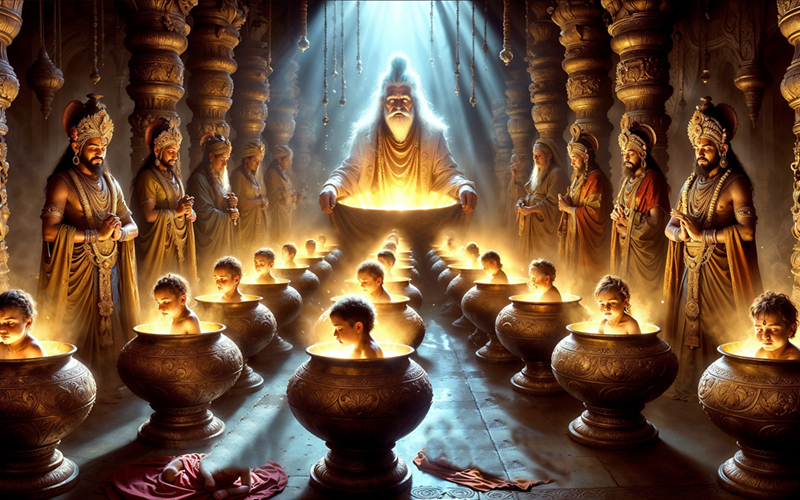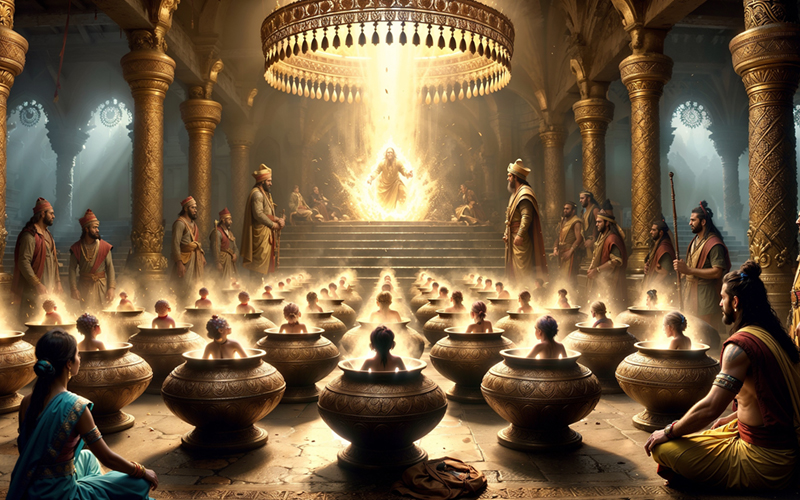Physical Address
Empirical System, 105 First Floor Pitru Krupa, Opp. R.K. Desai College, Koparli Road, Vapi (Gujarat) 396 191
Physical Address
Empirical System, 105 First Floor Pitru Krupa, Opp. R.K. Desai College, Koparli Road, Vapi (Gujarat) 396 191

In the epic tapestry of the Mahabharata, some threads are woven with divine light, while others are soaked in the shadows of destiny. The birth of the Kauravas is one such thread—a story of a miraculous boon, a mother’s anguish, and a prophecy of destruction that would echo across the battlefield of Kurukshetra.
This is not just a tale of a strange birth; it is a profound lesson on the weight of our choices, the clash between love and Dharma, and the inescapable hand of fate.
Gandhari, the virtuous and devoted queen of the blind king Dhritarashtra, had earned a powerful boon from the great sage Vyasa for her selfless service. Pleased with her piety, Vyasa blessed her:
“O noble queen, you shall be the mother of one hundred mighty sons, destined to rule.”
Joy filled the palace of Hastinapura. But this joy soon turned to an agonizing wait. Gandhari’s pregnancy stretched on for nearly two long, arduous years. As her anxiety grew, she heard news that her co-wife, Kunti, had given birth to the righteous Yudhishthira. The celebration in the Pandava household only deepened Gandhari’s despair. Her celebrated boon now felt like a cruel curse.
Consumed by frustration and a sense of failure, Gandhari, in a fit of grief, struck her womb. What emerged was not a child, but a cold, lifeless mass of flesh. Her cries of anguish reverberated through the palace halls. Her dream of mothering a dynasty lay shattered before her.
This moment of despair was not just a personal tragedy; it symbolized the kingdom’s growing anxiety about its future. The Kuru lineage seemed to hang by a thread.
Hearing of Gandhari’s plight, Sage Vyasa rushed to her side. His divine foresight knew that the boon was not lost, only delayed. He reassured the grieving queen, “Your boon shall not go unfulfilled. The divine promise remains.”
He instructed the attendants to bring 100 clay jars (some texts say 101) and fill them with sanctified ghee. With his mystical powers, he carefully divided the lifeless mass of flesh into one hundred and one pieces, placing each piece into a separate jar. These jars were sealed, blessed, and placed in a secluded, guarded chamber to continue their gestation.
Vyasa’s words rekindled a flicker of hope: “In time, from these jars, your one hundred sons and one daughter will emerge. Have faith.”

Months passed in tense anticipation. Then, one by one, the jars began to crack open. From the first jar emerged a healthy, crying baby—Duryodhana. He was soon followed by his ninety-nine brothers and, from the final jar, their lone sister, Duhsala.
The palace erupted in celebration. Dhritarashtra, blinded by paternal pride, ordered a grand feast. But amidst the joyous music, the wise men and sages felt a chill. The circumstances of this birth were strange, and the firstborn’s arrival was accompanied by terrifying omens.
As Duryodhana let out his first cry, it sounded not like a baby, but like the braying of a donkey. At that moment, the natural world reacted in terror:
Alarmed, the elders convened in the royal court. The wise Vidura, known for his foresight, spoke with a heavy heart:
“O King, these omens are dire. They foretell of great destruction for the Kuru dynasty. For the sake of the kingdom, for the sake of Dharma, I urge you—abandon this child.”
The great Bhishma echoed this sentiment, reminding Dhritarashtra that a king’s duty is to protect his lineage, even if it requires a terrible sacrifice.
But Dhritarashtra, overcome by a blind father’s love, refused. “How can I abandon my firstborn, my heir?” he cried. “I cannot act against my own heart.”
Gandhari, torn between a mother’s instinct and a growing dread, remained silent.
The birth of the Kauravas and the ignored prophecy is a pivotal moment that sealed the fate of millions. To truly understand the weight of this decision, we have brought this powerful story to life on our YouTube channel, Vibes of Divinity.
Witness the miracle, feel the foreboding, and see the choice that led to the great war.
[Click here to watch: The Miraculous Birth of the Kauravas: A Detailed Retelling]
Don’t forget to like, subscribe, and hit the notification bell to continue your journey into the heart of these divine stories!
The birth of the Kauravas is steeped in symbolism:
This story is a powerful cautionary tale about the conflict between personal attachment (moha) and righteous duty (dharma). Dhritarashtra’s choice to ignore the divine warnings out of love for his son set in motion a chain of events that would culminate in the devastating war of Kurukshetra. It is a timeless reminder that some decisions, once made, carry the weight of destiny.
What do you think would have happened if Dhritarashtra had listened to Vidura’s warning? Share your thoughts in the comments below!